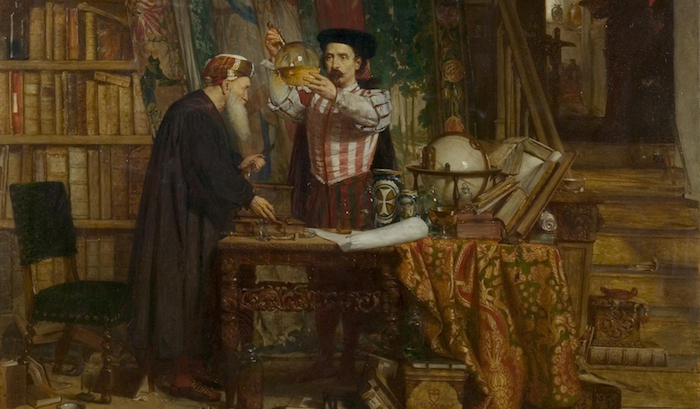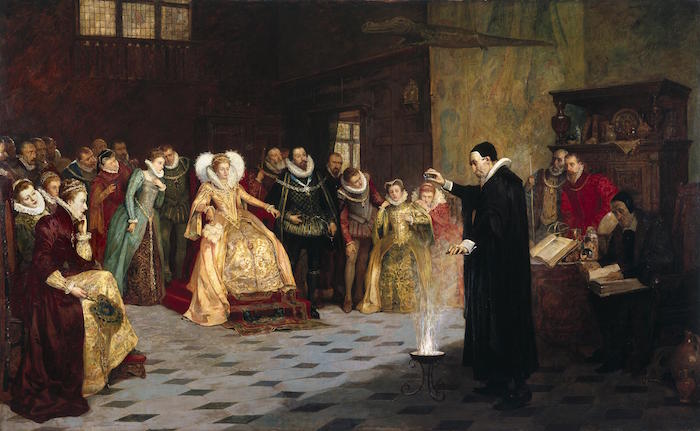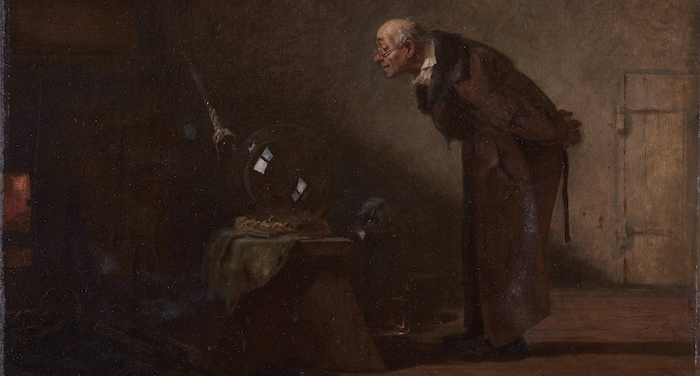Back in November, we looked at a weird ghost story from an even weirder source: Aubrey’s Brief Lives. This week we return to the Lives to look at his biographies of nine bizarre occult NPCs from 1600s Britain. Some were (according to Aubrey anyway) literally haunted by the ghosts of their sins; others were outright wizards! All are wild stories in their own right and are perfect to fictionalize and drop into your ongoing campaign.
This post is brought to you by beloved Patreon backer Colin Wixted. Thanks for helping keep the lights on! If you want to help keep this blog going alongside Colin, head over to the Patreon page – and thank you!

To recap from November, John Aubrey (1626-1697) was an English country gentleman. He had the ambition to write a collection of biographies of the great Britons of his era: roughly the 1600s, though he included many men who died old in the early 1600s, and so we think of as being more Elizabethan in character. Aubrey compiled a great collection of salacious gossip – mostly obtained at drinking parties – but he never actually wrote his book. Instead, he left behind a collection of notes and letters full of the sorts of details that seldom make it into sober scholarship. The longer and more interesting contents of these papers have been often published under the title Aubrey’s Brief Lives.
A good example of the content of Aubrey’s Lives is this quote about Edward de Vere, which you may be familiar with: “This Earl of Oxford, making of his low obeisance to Queen Elizabeth, happened to let a fart, at which he was so abashed and ashamed that he went to travel for seven years. On his return, the Queen welcomed him home and said, ‘My lord, I had forgotten the fart.’”
It’s amazing seeing 17th century Britain – a wild period full of civil wars, a regicide, a theocratic dictatorship, the restoration of the monarchy, and so much gilt and ostentation – through the eyes of one particular human with all his idiosyncrasies. Newton may be found in Aubrey, but only as an idle mention in other people’s stories. Shakespeare is in Aubrey, but only his comedies are mentioned – and only A Midsummer Night’s Dream by name. Aubrey seems less interested in Shakespeare’s literary work than in his friendship with Ben Johnson. By contrast, Aubrey presents an endless parade of doctors of divinity, breathlessly describing their interchangeable virtues.
Women appear rarely, and usually only in reference to their beauty or sexual proclivities. A good example is the entry for Eleanor Radcliffe, the Countess of Sussex: “A great and sad example of the power of lust and slavery of it. She was as great a beauty as any in England, and had a good wit. After her lord’s death (he was jealous) she sends for one (formerly her footman) and makes him groom of the chamber. He had the pox and she knew it; a damnable Scot. He was not very handsome, but his body of an exquisite shape. His nostrils were stuffed and borne out with corks in which were quills to breathe through. About 1666 this countess died of the Pox.”

Francis Bacon (1561-1626), statesman and father of the scientific method, was interesting for the people he surrounded himself with. His page, Mr. Cockaine, received a cabinet of jewels from the British East India Company, intended as a gift for Bacon, but instead ran off with it and lied about it. Bacon’s friends and proteges took bribes to try to influence his thinking, but only succeeded in taking the money, not in swaying him. And his widow remarried to a Sir Thomas Underhill, with whom she had so much sex that she made him deaf and blind – which certainly doesn’t reflect well on the sexual competence of Bacon, her previous husband.
Another of Bacon’s pages, Thomas Bushell (1594-1674) had the dumbest nickname in human history: he wore more buttons than usual on his coat, so everyone called him ‘Buttoned Bushell’, which proves people have changed not a bit in 400 years. Bushell carried a lot of debt, but lived so long that most of his creditors died first, and their grandchildren and great-grandchildren forgot all about the money they were owed. He decorated his house like a teenage goth with too much money: he hung black curtains along the hallways, painted skulls and recumbent skeletons on the walls, kept a preserved corpse as a decoration, and built a pyramid on the grounds. The Queen Mother gave Bushell a mummy as a gift, but his estate was humid and the mummy got moldy.
Surrounding an NPC with figures based on Bacon’s friends and attendants is a great way to flesh out a household: a thieving page, an undersexed spouse, a friend who’s trying to influence-peddle without success, and this mega-goth up to his eyeballs in debt. If whoever gave your version of Bushell the mummy comes to call, the household may be engaged in a frantic Weekend at Bernie’s escapade trying to pretend that the mummy is intact and not moldy.

William Oughtred (1574-1660) was a mathematician best known for inventing the slide rule, using an ‘x’ to signify multiplication, and abbreviating sine and cosine as ‘sin’ and ‘cos’. He was a chemist too. As with most chemists of the era, he was certain he was on the brink of discovering the philosopher’s stone, which he envisioned as a clear liquid. And naturally Oughtred was an astrologer. He had a knack for predicting the birthdays of yet-unborn children, though he admitted to having no idea why his formulas worked. He suspected that some otherworldly spirit was giving him a hand without his knowledge. His son was confident Oughtred knew real magic.
Oughtred’s country neighbors were suspicious of him. He was more famous abroad than at home, so when great mathematicians traveled from the continent to visit him and compare notes, it confused the neighbors. Who were these weird foreigners, and why did they keep coming to the countryside to visit this sorcerer? They were quite sure Oughtred could conjure spirits, and he did not disabuse them of the notion. Before he died, he burned most of his books and papers, which only raised greater suspicions.
An NPC based on William Oughtred is probably happy to leave ambiguous just how many of the rumors about him are true. He has a large library he won’t let you enter, widely-traveled friends he conspicuously doesn’t talk about, and a knack for guessing minor events before they occur.

Caisho Borough (died 1643) was haunted by the ghosts of two Italian lovers of his. The first was visiting London when she espied the handsome young Borough. She was so taken with him she agreed to sleep with him – provided he told no one. Thereafter she died. Borough was down in a tavern and bragged about screwing her, figuring her death absolved him of his oath. But it wasn’t so! For when he went to take a piss, what did he see but her shade! “He was afterwards troubled with the apparition of her, even sometimes in company when he was drinking. But only he perceived it.”
The second ghost was that of a Florentine courtesan, mistress to the duke. They became intimate while Borough was traveling in Italy. The jealous duke (either Alessandro or Cosimo di Medici) conspired to have Borough killed. The Englishman was notified of this scheme by some friends and fled back to Britain without telling his lover. Bereft, she committed suicide. At the moment of her death, her ghost appeared to Borough, and she told him exactly how little she thought of him. She also cursed him that he would be killed in a duel, which later happened. Like the first ghost, this one frequently appeared to hound Borough, but this one could be seen by other people. King Charles I found the whole affair so interesting he ordered it investigated. His investigators backed up Borough’s story.
An NPC based on Borough probably has two primary motivations: releasing himself from the death-curse, and getting rid of these ghosts! It’s up to you whether the ghosts are real and whether the party can see them. Your Borough-analogue may be a well-connected man and be willing to do favors for people who promise to help him.

Carlo Fantom was a Croatian mercenary captain in the service of the Earl of Essex. His particular skill was in teaching modern cavalry tactics to the Parliamentarian army. He was unapologetic about fighting for money, not for ideology. He fought for both sides in the English Civil Wars, and also fought both for and against the Ottoman Empire.
Fantom was supposedly immune to bullets. Near Bedford, Fantom took a horse without permission in sight of his colonel. The colonel shot at him, puncturing Fantom’s coat and setting his shirt to smoldering. Fantom either shot back or handed the spent bullets back to the colonel (Aubrey is unclear), saying “Here, take your bullets again.” Fantom had this ability because he took a secret herb known to “the keepers in their forests… which made them to be shot-free. They call them ‘Hardmen’. … They say that a silver bullet will kill any Hardman, and they can be beaten to death with cudgels.”
Fantom was a serial rapist and even encouraged his soldiers to commit the same crime. The Earl of Essex twice saved him from the noose, for he was too valuable to the Parliamentarian cause to hang. But when Fantom switched sides to fight for King Charles, he lost his powerful friends. The third time Fantom was tried, he was executed. Turns out a noose doesn’t care if you’re bulletproof.
An NPC based on Carlo Fantom is a good minor villain (might want to replace the rape with some other crime, though). He’s terrible, but in a believable way. Him being bulletproof is a good surprise, and figuring out how to overcome it is a fun obstacle.

John Dee (1527-1608) was the court wizard of Queen Elizabeth I. You may have guessed he’d appear here. As with the other figures, I’m less interested in his true biography than in what Aubrey has to say about him. And Aubrey describes him like Merlin: tall, slender, with a long white beard, and wearing a gown with billowing sleeves. He could create gold, summon storms, find lost things, and possessed the philosopher’s stone.
Dee once turned down a princely offer from the tsar of Russia: “He was sent ambassador for Queen Elizabeth into Poland. The emperor of Muscovy, upon report of the great learning of the mathematician, invited him to Moscow with offer of two thousand pounds a year, and from Prince Boris one thousand marks; to have his provision from the emperor’s table, to be honorably received, and accounted as one of the chief men in the land. All of which Dee accepted not.”
Finally, Aubrey tempts us with a lost library and a lead for where to find it: “Meredith Lloyd says that John Dee’s printed book of Spirits is not above the third part of what was written, which were in Sir Robert Cotton’s library; many of which were much perished by being buried, and Sir Robert bought the field to dig for it.”
An NPC based on Dee (or at least Aubrey’s Dee) works best if he’s dead. He’s a source of plot hooks that way: what power did your fictional queen have over your Dee-analogue that she could keep him from moving to Moscow? (Correct answer: a power she could turn on the PCs, but they might be able to weasel out of it now that they know the secret.) Did your version of Sir Robert Cotton succeed in recovering any of Dee’s lost library? (Correct answer: only a few volumes, which he keeps secret and safe. Another much more dangerous treasure hunter is now digging in the field.) And don’t forget that a powerful sorcerer like Dee is never really dead. After the PCs have had a session or two following up on his plot hooks, Dee might mosey back into the realm of the living.

Thomas Harriot (1560-1621) was a mathematician, surveyor, and astronomer. He once said “that he had seen nine comets and had predicted seven of them, but did not tell how.” An NPC based on Harriot is either an empty braggart or a cunning soothsayer – though if you could pull off him being both, that’d be even better.
Silas Taylor (1624-1678) was a historian and a captain in the Parliamentarian army. He found in a church library a document he said was the original 964 A.D. claim by King Edgar the Peaceful that he’d been granted (it’s unclear by whom; perhaps the Pope?) sovereignty over the seas surrounding England. Taylor “offered it to the king for 120 pounds, but his majesty would not give so much.” An NPC based on Taylor is a greedy weirdo with a scroll he claims grants magical authority over the sea.
Sir John Dayrell (circa 1500s, possibly actually named Sir William Darrell) impregnated his wife’s maid but didn’t want to deal with his bastard baby. He brought mother and midwife blindfolded to a secret location to deliver the baby, then burned the baby in a fire. The midwife found the money he gave her didn’t silence her conscience. She knew the secret place was in a fine house because the ceilings were tall. She calculated how far she’d ridden while blindfolded, narrowed down the options, and went to a judge. There was an investigation and the midwife identified the chamber in question. But Sir John paid off the judge and the suit was dropped. An NPC based on Sir John is best after the case is over: he just got away with murder, and he thinks he’s untouchable.
A Long-Ago Popham, an ancestor of the Pophams of Somerset, was kidnapped by “Turks” (possibly North African pirates) and enslaved. But his wife continually prayed for him to be released. By her great piety, he was transported home “by an invisible power with these shackles on his legs, which were hung up as a memorial and continued until the house was burned.” An NPC based on either Popham is probably renowned for their piety, and is not someone you want to cross, since God clearly looks out for them.

I’ve been meaning to try an experiment on the Molten Sulfur Blog: injecting a little more of myself into my work. In webcomics, I always enjoy it when the artist puts beneath the comic a little snippet of commentary on the day’s update or just a mention about what they’re up to. It humanizes the work. So I’m going to give it a whirl with a short section tentatively titled ‘End Matter’, after the term for the appendices, maps, bibliographies, etc. found at the back of a book. You can tell it’s a good name because I have to explain it.
My Kickstarter for Shanty Hunters wrapped up last Thursday. It raised $16,000. My last Kickstarter raised only $2,500 and all told actually cost me a bit of money. Shanty Hunters was thus a nice change. In 2020, I collected metrics on how tickets to Shanty Hunters games sold at Gen Con, as compared to other games whose Kickstarter campaigns had already concluded. Based on those metrics, I expected Shanty Hunters would gross about $21,000, so I guess the technique’s pretty good for a ballpark estimate.
Honestly, at this point I’m exhausted. Running a Kickstarter is hard work. But I’m on the right track. Someday I’d like to write RPG content full time, and Shanty Hunters has proved a valuable stepping stone on that path.
My next step is to make the Molten Sulfur Blog more searchable. This is post 226 – by now I imagine if you need an adventure or NPC or puzzle or something for your game tonight, I probably have a post that meets that need. I want to make it easy for you to find that post. I want you to be able to type a term into a search bar on the site, then filter your results by geography, time period, subject matter, and theme. I want to make the Molten Sulfur Blog the first place you turn to for content for your campaigns.
How long will that take? We’ll see. I’ve got a day job, I’m going to grad school at night on the G.I. Bill, and I’m still putting out a post every Tuesday. These changes to the blog will happen when they happen. But I’m excited. Watch this space!






